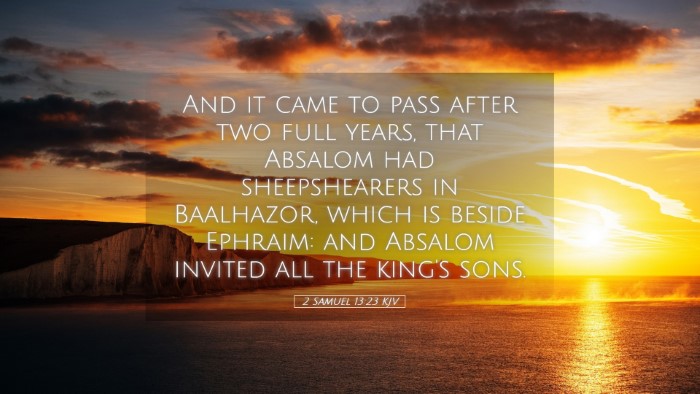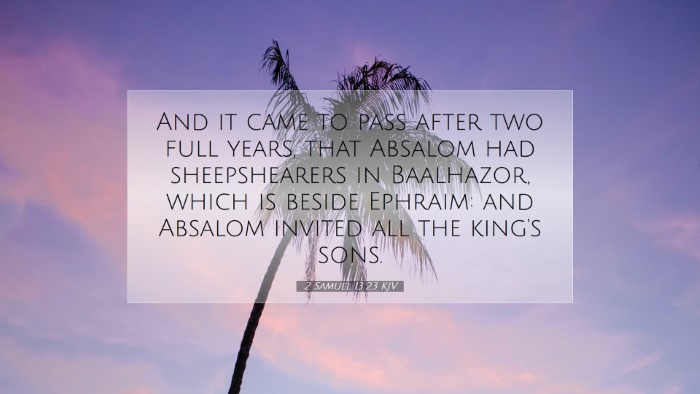Commentary on 2 Samuel 13:23
Verse: "And it came to pass after two full years, that Absalom had sheep shears in Baalhazor, which is beside Ephraim: and Absalom invited all the king's sons."
Introduction
The account of Absalom's sheep-shearing feast is a pivotal moment in the narrative of 2 Samuel, revealing themes of betrayal, revenge, and the tragic consequences of familial strife. This verse sets the stage for the unfolding of Absalom's plot against his half-brother Amnon, following the grievous sin of Amnon against Absalom's sister, Tamar.
Contextual Background
To fully grasp the implications of 2 Samuel 13:23, one must consider the preceding narratives, specifically the events surrounding Tamar’s violation (2 Samuel 13:1-22) and the resultant animosity between Absalom and Amnon. Absalom, driven by a desire for justice—however unlawful it may have been—was determined to avenge the wrong done to his sister.
- Absalom's Character: A charismatic leader, Absalom harbored deep resentment and a sense of justice for Tamar, portraying a combination of charm and lethal intent.
- Time Frame: The mention of "after two full years" demonstrates the long-held grudge Absalom harbored, indicating both patience and a deliberate plan.
Insights from Matthew Henry
Henry notes the significance of sheep-shearing time, a festival that was often associated with joy, feasting, and communal gathering. He emphasizes that Absalom cleverly chose this time to mask his nefarious intentions, suggesting that he understood the cultural significance and the likely attendance of King David's sons.
- Plan of Deceit: Absalom's invitation to all the king's sons demonstrates a façade of hospitality, hiding his intentions for vengeance.
- Symbolism of Sheep Shearing: This act resonates with the biblical notion of pastoral care and sacrifice, contrasting the underlying malice of Absalom's heart.
Insights from Albert Barnes
Barnes extends the analysis of Absalom's calculated move through the mention of Baalhazor, an area associated with wealth and abundance. The invitation to a festive gathering under such auspices enhances the treachery of his intent.
- Strategic Location: Baalhazor was significant for its agricultural prominence, and the allure of sheep shearing would draw many to the event.
- Absalom’s Manipulation: He uses this event as a means to orchestrate Amnon's assassination, showcasing the complexities of familial ties and ambition.
Insights from Adam Clarke
Clarke draws attention to the emotional and psychological warfare at play in Absalom's actions. He reflects on family dynamics, illustrating how love can swiftly turn to hatred. Clarke’s commentary emphasizes the severity of Absalom’s choice to bide his time, describing it as premeditated and indicative of a deeper malice.
- The Nature of Vengeance: Clarke remarks on the destructive nature of vengeance, equating Absalom’s delay with the weight of unchecked anger and eventual violence.
- Family Disintegration: This moment is emblematic of the broader narrative of familial failure within David’s household, where sin begets sin and revenge supplants love.
Theological Reflections
This text invites theological reflection on the nature of sin and its consequences. Absalom's actions challenge leaders today to recognize the potency of unresolved familial conflict and the lure of vengeance.
- Divine Justice: Readers are reminded that God reigns over the plots of men, and while Absalom's actions seem successful at first, they ultimately lead to his own demise.
- Restorative Justice vs. Retributive Justice: The narrative raises questions about the proper response to wrongdoing. Should one seek justice through rightful means or be tempted toward revenge?
Conclusion
2 Samuel 13:23 serves as a sobering reminder of the human condition and the complexities of our moral choices. The seemingly innocuous beginning to Absalom's plot harbors grave consequences that resonate throughout scripture. It serves as a call for introspection among pastors, students, and scholars alike to consider the weight of sin, the desire for justice, and the intricacies of human relationships.


